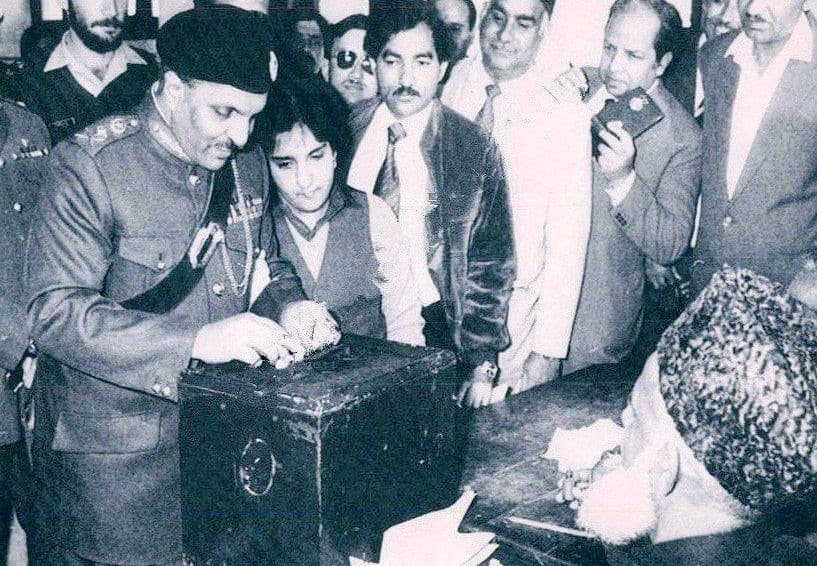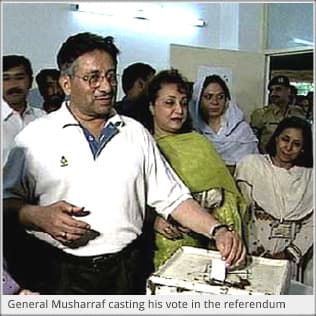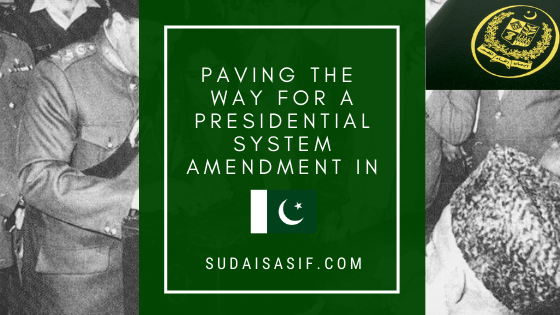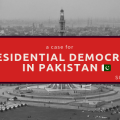In the backdrop of the Imran Khan-led government doing everything it can, perhaps unintentionally to undo Pakistan, we’ve lost the enthusiasm seen a few months ago in debates talking about a presidential system for Pakistan. Much needed it is then that we take a look at this intricate issue and how it could come to be implemented if the government ever wanted to do so. To start with,
[perfectpullquote align=”full” bordertop=”false” cite=”” link=”” color=”” class=”” size=””]
Few years back, the Supreme Court in its decision in 18th and 21st amendment case as authored by Justice Shaikh Azmat Saeed had declared parliamentary form of government as one the Salient Features of the Constitution..
– Ansar Abbassi from The News
[/perfectpullquote]
For the unacquainted, the theory of salient/basic features holds the notion that certain clauses of the constitution such as human rights and freedom of speech cannot be significantly altered or repealed. Hence, these features can only be worked upon by establishing a constituent assembly.
However, if in the future, we are to see the Supreme Court overturn its decision of terming the Parliamentary system as a salient feature, 2 ways exist to bring in an amendment for the Presidential system:
The first and foremost way is through the Pakistan National Assembly by voting on a constitutional amendment. This would require a 2/3rds majority to pass which equates to 228 votes out of the 342 seats that exist. To evaluate whether this option could succeed is a futile exercise indeed.
Firstly, the PTI government which would be the main advocate of such a move barely has managed to form a 51% majority to form their government. This also consists of coalitionary parties which would be very opposed to such a move. The same goes for the opposition parties and the reason is expectedly selfish. If a presidential system is established:
- The members of parliament would be prohibited from being members of the prime minister’s cabinet. With this, the opportunities for corruption are reduced significantly resulting in political stalwarts both within and outside the government opposing this move. After all, everyone wants to get elected for government making, not the lowly perceived purpose of legislation for the country’s law and order.
- The president can be directly elected with a separate election which does not require that candidate to be the head of any political party. Unsurprisingly, neither Bilawal Bhutto neither Shahbaz Sharif would support such a move as it will allow other promising figures to challenge the existing status quo they inherited.
But even if it does pass miraculously, it will be transmitted to our upper house – the Senate – thereafter and require a similar majority vote. If it also passes in the Senate, there’s another obstacle because of the nature of the amendment. According to Article 239(4),
A Bill to amend the Constitution which would have the effect of altering the limits of a Province shall not be presented to the President for assent unless it has been passed by the Provincial Assembly of that Province by the votes of not less than two-thirds of its total membership.
– The Constitution of the Islamic Republic of Pakistan
Hence, the usual procedure of the presidential assent would not apply but the bill would also go through the provincial assemblies. One could rightly so figure out that this method would hold zero chances of succeeding in today’s political climate which brings us to our next method.
The second and feasible way is to hold a referendum. This is the path Turkey choose to transition from a parliamentarian democracy to the presidential system back in 2018.
As for us, we’ve had 2 referendums in the past. The first one was held by General Zia-ul-Haq on December 19, 1984, seeking support for his continuation as president for the next 5 years. He successfully extended his tenure.

Zia-ul-Haq casting his vote during the referendum, image by Dr.Ghulam Nabi Kazi
The second one was held on 30 April 2002, by General Pervez Musharraf through which he also managed to extend his rule by 5 years till 2007. Both of these were widely opposed and deemed unconstitutional.

Image by Story of Pakistan
As it can be seen, Pakistan’s history with referendums isn’t rosy, to make it different this time would require proper measures to ensure its legitimacy is acknowledged by all. Our shady past with them shouldn’t overshadow a legitimate quest.
However, 2 concerns arise from this option which must be addressed:
- The threat of the results of the referendum being rigged by forces that do not want such a change or those that do want such a change. We could safely avert this threat by positioning the Pakistan army countrywide alongside civilians.
- Since provinces such as Punjab and Sindh have the largest populations, this would result in unequal representation of the provinces. Truth being said, this shouldn’t be a concern. At the end of the day, all provinces consist of the people of Pakistan and as long as after the referendum passes, provinces are guarded against inequality through an equal number of seats in either house of the parliament, no injustice will be done. A model we could follow in this regard is of the USA which I touched upon in one of my other pieces as well citing an example of the Congress where all states are represented based on the population while the Senate has equal representation. This ensures that both houses keep a check on each other and members from the National Assembly cannot misuse their power to get larger provinces unfair rights.
The question now remains on what will it take for Imran Khan to convince his allies both within the party and outside to call a referendum. We could play our part by acting as pressure groups and urging the government to take action. Consider this with the help of a hypothetical yet likely scenario:
- The public pressurizes the government for a referendum.
- Imran Khan makes the assembly agree not on the pretext that he wants to but the people do and so their wishes should be realized.
- A legislative piece is created for the referendum and put on the assembly floor.
- If passed, we have a referendum.
The path is by no means easy, however, if we are to break this dictatorship where a single man does not but political parties do indeed rule us together, we have to take this step. Otherwise, we’ll continue to see meritocracy be made a joke of every day, ministries will continue to be allocated to politicians who do not have any relevant experience – all in the name of parliamentary democracy.



